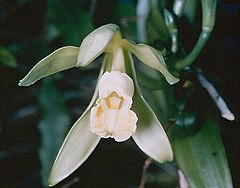Vanilla (genus)
|
Vanilla Temporal range: Early Cretaceous - Recent 109–0 Ma |
|
|---|---|
 |
|
| Flat-leaved Vanilla (Vanilla planifolia) | |
| Scientific classification | |
| Kingdom: | Plantae |
| (unranked): | Angiosperms |
| (unranked): | Monocots |
| Order: | Asparagales |
| Family: | Orchidaceae |
| Subfamily: | Vanilloideae |
| Tribe: | Vanilleae |
| Subtribe: | Vanillinae |
| Genus: |
Vanilla Plumier ex Mill., 1754 |
| Species | |
 |
|
| Green: Distribution of Vanilla species | |
| Synonyms | |
|
|
Vanilla, the vanilla orchids, forms a flowering plant genus of about 110 species in the orchid family (Orchidaceae). The most widely known member is the flat-leaved vanilla (V. planifolia), native to Mexico, from which commercial vanilla flavoring is derived. It is the only orchid widely used for industrial purposes in flavoring such products as foods, beverages and cosmetics, and is recognized as the most popular aroma and flavor. The key constituent imparting its popular characteristics is the phenolic aldehyde, vanillin.
This evergreen genus occurs worldwide in tropical and subtropical regions, from tropical America to tropical Asia, New Guinea and West Africa. Five species are known from the contiguous United States, all limited to southern Florida.
The genus was established in 1754 by Plumier, based on J. Miller. The word vanilla, derived from the diminutive of the Spanish word vaina (vaina itself meaning sheath or pod), simply translates as little pod.
This genus of vine-like plants has a monopodial climbing habitus. They can form long thin stems with a length of more than 35 m, with alternate leaves spread along their length. The short, oblong, dark green leaves of Vanilla are thick and leathery, even fleshy in some species. But there are also a significant number of species that have their leaves reduced to scales or have become nearly or totally leafless and appear to use their green climbing stems for photosynthesis. Long and strong aerial roots grow from each node.
...
Wikipedia
